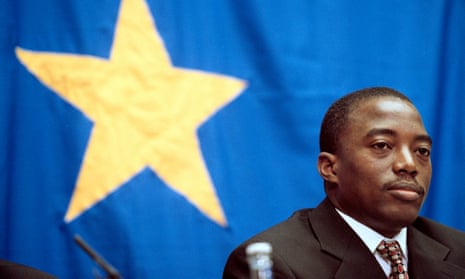Just over a decade ago, the Democratic Republic of the Congo witnessed a profound moment in the country’s history, when millions of people went to the polls to vote for a new constitution.
It was significant, not least because the wording of the constitution had been agreed by the government and dozens of rebel leaders, who had finally come together after seven years of war.
A key part of the constitution dictated that a presidential election must be held every five years, with a non–renewable presidential limit of two terms. This detail was crucial for a simple reason: no president of the DRC since independence in 1960 had met a peaceful political end.
The DRC’s first president, Joseph Kasavubu, was overthrown in 1965 by Joseph Mobutu, plunging the country in chaos and a kleptocracy that lasted 32 years, ruining the economy and the little infrastructure that the Belgians, the DRC’s colonisers, had left behind. Kasavubu died four years later under house arrest in Boma, which had been the colonial capital of the former Congo Free State.
In May 1997, Laurent-Désiré Kabila, backed by the armies of Rwanda and Uganda, overthrew Mobutu, sending him into exile in Morocco.

Less than four years later, Kabila was murdered during an attempted coup, allegedly by one of his bodyguards, 40 years after the assassination of Patrice Lumumba, the DRC’s independence leader and first prime minister.
Joseph Kabila, the current president, assumed power after his father’s death. He had joined Laurent-Désiré Kabila’s rebel group, the AFDL, as a 23-year-old and had been made a deputy commander of the DRC army after a three-month military training programme in China.
At first, it seemed as if Kabila was broadly supportive of democracy in his country. A year after he oversaw the signing of the constitution, 15 million Congolese voted for a government for the first time in more than 40 years.
Though it was far from a perfect or peaceful election, it was a landmark moment. Kabila was duly announced the winner with 58.05% of the vote, formally ending the so-called 1+4 transition period that brought the government and dozens of rebel leaders together in a loose coalition.
Five years later, in 2011, Kabila organised another election, which he won again, but this time amid allegations of fraud.
Fast-forward to the present and Kabila, who is constitutionally barred from running again, appears to have changed his mind about democracy.
He is refusing to hold an election and cede power, attacking anyone who calls for him to stand down. Despite months of warnings from the US, Britain and the EU that he should organise a free and fair election, and proudly allow for Congo’s first peaceful and democratic transfer of power, he continues to stand firm.
One reason he will not go is that power is profitable. When Mobutu was overthrown, he had amassed an estimated fortune of $5bn (£3.8bn), the rough equivalent of Congo’s total foreign debt at the time. Kabila is also alleged to have embezzled billions.
What comes next is anyone’s guess, but if the killing on Monday of at least 44 pro–democracy protesters by the Garde Républicaine, Kabila’s private army, is any indication, he is sowing the ground for more wars and more misery.
